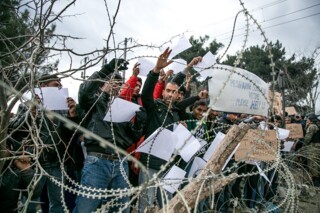On the Greek-Macedonian Border
Oscar Webb
A refugee camp has sprung up at Idomeni on the Greek-Macedonian border. Just over two weeks ago, Macedonia closed the border to certain non-European nationalities. If you’re not from Syria, Afghanistan or Iraq, you can’t cross. Around 2000 people, mostly from Morocco, Iran and Bangladesh, are stuck. They live in poor and deteriorating conditions, waiting, in hope, for the border to reopen to them.
Among a tangle of wires and the deafening thrum of a diesel generator, Anis, a 29-year-old Moroccan, sat with twenty or so other men and women, charging his phone. ‘People here are very hungry and very, very, very cold,’ he said. ‘Yesterday we didn’t sleep until 4 a.m. because it was so cold.’
‘Children are losing weight,’ Hussein, from Iran, said. ‘A nine-year-old Iranian boy was 20kg when we arrived here a week ago, now he is 15kg.’
A group of Greeks arrived in a van with food supplies. ‘This is for the children who need it,' a volunteer said as the crowd tried to open the back doors. But the crowd wouldn't back off so they eventually drove away without unloading.
People sleep in small tents donated by individuals and NGOs; they pitch them inside the larger white UNHCR tents or on the railway tracks, where the drainage is better. Around the camp there are intricate excavations where people have dug out channels to keep the water away; when it hasn't worked they’ve picked up the tents and moved away.
Day and night, people burn old railway sleepers and rubbish to stay warm. Your throat gets tight if you stand in the acrid smoke for too long. The temperature drops to around freezing most nights and snow has started falling on the nearby hills. Some of the UN tents have gas heaters, but they don’t always have gas in them.
Down the railway tracks, a queue of people a hundred metres long snaked its way to an abandoned boxcar. Inside, German volunteers from ‘No Borders’, who say they aren't a group but a collection of autonomous individuals, were handing out thick soup in plastic cups. The twenty volunteers drove to Idomeni four days ago in a big green Mercedes truck that used to carry horses. They were at Presevo, feeding refugees crossing the Serb-Macedonian border, but the need appeared greater at Idomeni so they packed up and moved. ‘Yesterday we cooked 3000 meals,’ one of them said. ‘We were working for 24 hours.’
There’s one other small kitchen, which has been on the ground for five days. ‘We’re cooking all the time and we’re slowly getting more efficient,’ Jordi from Barcelona, slicing onions in a white tent, said. I asked him where the larger NGOs were. ‘The big NGOs, they call it the ghetto,’ he said. ‘It’s really quite safe though.’ In the middle of a cluster of UNHCR shelters and small tents, the kitchen is a centre for many of the people living around it. ‘Two days ago, when a man was electrocuted on the railway,’ Jordi said, ‘the crowd rushed to us and asked for our help.’ The man had run across a train carriage roof and touched a stray wire; people who saw him on the ground afterwards said his clothes had fused with his skin. He was admitted to hospital and is said to be alive.
There used to be protests on the border at Idomeni: last week nine Iranian men sewed their mouths shut; people tried to push their way past Macedonian riot police. Since Macedonia built a razor wire fence, however, there has been very little action on the border. A kilometre along the train tracks, in the two cafes formerly frequented by freight train drivers, the talk has turned to alternative ways to get north.
A group of Iranians staying in my hotel – the hotels are full of refugees and migrants who can afford not to stay at Idomeni – bought fake Syrian passports and papers for €200 each. One of them went back to Athens to pick them up. They’re going to try crossing the border again as Syrians. Meanwhile they get drunk in the hotel bar and argue about whether the plan will work. ‘It’s going to be difficult, but what other choice do we have? If we go back to Iran now, we’re dead.’

Comments
His answer(loosely translated): "It's not just what you do, it is also who you are".
The sons and daughters of Socrates, Plato, Aristotle, and Alexander remember the lessons of history in their humanity.